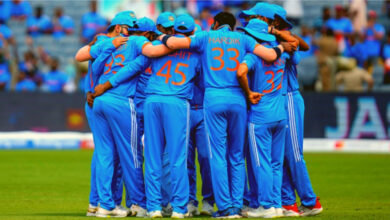Sunil Gavaskar wants ex-players like Rahul Dravid, Ricky Ponting in MCC panel that makes rules

While India scored a four-wicket win over England in the second ODI at Cuttack riding high on captain Rohit Sharma 90-ball knock of 119 runs, Sharma’s dismissal has once again brought back discussion on a rule change on non-striker not being on strike if the two batsmen crossed ends cricket’s rules body Marylebone Cricket Club (MCC). After Sharma’s dismissal against Liam Livingstone in the 30th over during India’s innings, Sharma and non-striker Shreyas Iyer had crossed when Adil Rashid took the catch but the rule, which was changed in 2022, meant that new batsman Axar Patel took the strike. Former Indian captain Sunil Gavaskar believes that former players like Rahul Dravid and others should be in the MCC’ rules committee.
“The laws are changed MCC. At the moment, the laws are with the MCC. It’s a private club that makes the laws of international games all over the world. And I do believe that there should be some international experience there. Maybe some former captains should be there. Just giving a few names. Graeme Smith, Rahul Dravid – somebody who’s been a recent coach. Ricky Ponting has been around. These are the people who I believe should be in that laws committee. You need playing experience over there and the committee that is there, I am not too sure there is international experience,” Gavaskar said on Star Sports.
Prior to 2022, a non-striker was able to take up the strike after a batsman was dismissed following a catch and the two batsmen had crossed ends. But with the new rule in March 2022, cricket sees the new batsman taking up the strike in the similar scenario. When Patel took the strike after Sharma’s dismissal, Patel faced the remaining two deliveries of the over with Shreyas Iyer on the other end and India needing 85 runs from 20 overs. Gavaskar opined that the other rules changes like two bouncers in an over or other rules had reasons behind it. But he sees no reason behind this rule change.
“There’s umpiring experience, Yes. Simon Taufel is there. But for any law to change, there needs to be some background. Like the playing conditions came in for two bouncers in an over, one bouncer in an over, or 90 overs in a day, there were reasons behind it. I don’t know whether there was a reason to change this law so that the non-striker would no longer be on strike if the players crossed ends and the batter who played the ball was out caught. I just think that was such an important television aspect too,” Gavaskar further added.







